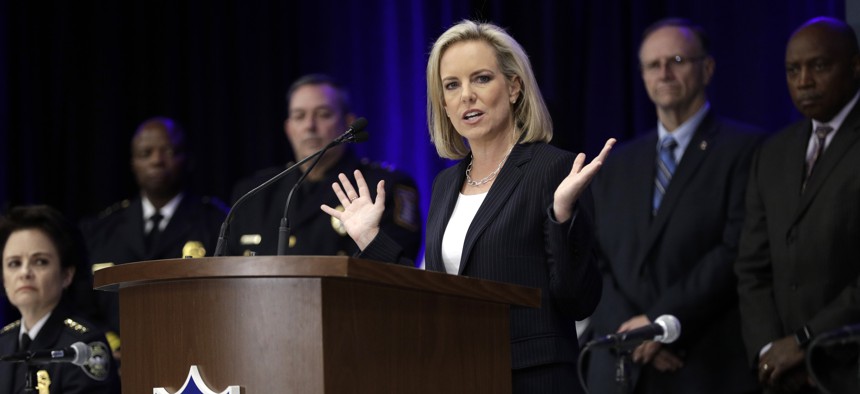While You're Watching Super Bowl LIII, DHS and Atlanta Will Be Watching You

Secretary of Homeland Security Kirstjen Nielsen speaks during a security news conference for the NFL Super Bowl 53 football game Wednesday, Jan. 30, 2019, in Atlanta. AP Photo
Federal and local law enforcement are combining efforts—and technology assets—to secure the biggest sports event of the year.
On Sunday, two teams and hundreds of thousands of fans will descend on Atlanta, Georgia for the 53rd Super Bowl. Those players and fans will be protected by some 600 employees of the Homeland Security Department and a host of technology provided by the city and the federal government.
“Our Atlanta-area public safety team has done an outstanding job in developing their plan for this weekend’s activity,” Homeland Security Secretary Kirstjen Nielsen said during a joint press conference Wednesday. “You can rest assured they have thought of every contingency and have worked extraordinarily hard to make this a safe and secure gameday.”
Homeland Security and FBI officials worked with local law enforcement to plan day-of operations and made recommendations to bolster security at the event, including “more than 100 different physical and cybersecurity assessments,” Nielsen said.
“In addition to what the human talent affords us, we also are relying heavily on technology. And everyone that has come to the table has brought some shape or form of that for us to leverage,” Atlanta Police Chief Erika Shields said.
Nick Annan, special agent in charge of the Homeland Security Investigations unit for Immigration and Customs Enforcement in Georgia and the lead federal security coordinator for the Super Bowl, enumerated some of those technologies being employed.
“Numerous DHS agencies involved in Super Bowl LIII have committed in excess of 600 assets, which include: special agents, pilots, K9 dogs, handlers, advanced cargo and vehicle screening technology, special response teams, magnetometer screening trainers, air assets, mobile command centers, anti-human trafficking, counterfeit ticket and merchandise investigative teams, consequence management, bio-watch screening, you get the idea,” Annan said during the press conference.
Starting Thursday, Atlanta will also be a no-drone zone, officials said this week.
In an interview with Nextgov, Annan declined to go into specifics on cutting-edge technologies being deployed, citing security concerns, but mentioned Atlanta’s network of cameras, along with those in Mercedes-Benz Stadium and federally-provided helicopters that will be airborne during the event. All those cameras are feeding in to the joint operations center.
“That’s probably the No. 1 piece of technology,” Annan said.
“The cutting-edge piece, a lot of that, by definition, is law enforcement sensitive,” said Bryan Cox, Southern Region communications director for Immigration and Customs Enforcement.
Cox was able to share a few of the technologies being used, including the video monitoring—which is being combed by humans, as well as algorithms, he said—and using radar to scan vehicles for dangerous materials.
“There are a variety of seen and unseen security measures that go into protecting the game,” he said.
Technology has been an integral part of Homeland Security’s mission since the department was established in the wake of the Sept. 11, 2001 terrorist attacks, but it’s not everything, Annan said.
“The benefits of the advancements in technology have allowed us to secure things, look at things, see things that in the past took a lot of manual labor,” he told Nextgov. “I still would say that while technology is fantastic, there is still just some good, old fashioned police work that technology will never replace.”
Aaron Boyd is a Senior Editor at Nextgov, which originally published this article.
NEXT STORY: Wary of Teacher Walkouts, States Aim to Boost School Spending






